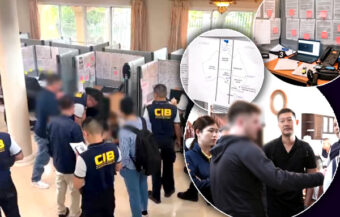New Finance Minister expected amidst GDP downgrades | Economic malaise deepens as new finance minister anticipated in April. Amidst ballooning private sector debt and structural impediments, Pichai Chunhavajira has emerged as the front-runner for the role. Srettha’s trenchant criticism of the central bank has sparked unease.
A new Minister of Finance may be appointed in April. It comes as the Pheu Thai-led government comes to terms with economic realities. This includes the growing problem of ballooning private sector debt and structural impediments to growth. At the same time, most analysts agree that Prime Minister Srettha Thavisin, who currently handles the role, has spooked markets with his overt criticism in recent months of the country’s central bank. The potential appointment of a new Finance Minister has seen the name of Pichai Chunhavajira emerge. Mr Pichai, the stock exchange boss, is a stalwart of the Pheu Thai Party and significantly, the Shinawatra family.

Since Thaksin Shinawatra’s release on parole on February 18th, the role of the Shinawatra family in government has grown stronger. It now appears that Prime Minister Srettha Thavisin will cede his role as Minister of Finance.
The talk in Bangkok is that the man for the job is Pichai Chunhavajira.
A known advisor to both Mr Srettha and the Shinawatra family, rumours of his ascent to the role of Finance Minister are widespread. Certainly, these gained traction following his recent divestment of a substantial stake in BCPG Plc.
The company is a leading renewable energy generator based in Bangkok.
Tipped new Finance Minister is currently Chairman of the Stock Exchange of Thailand (SET). Divested himself of shares worth ฿8.54 billion in recent days
Pichai, at the same time, is the current chairman of the Stock Exchange of Thailand (SET). It has been confirmed that he has just completed the sale of his entire 1,169,642 shares in BCPG at a price of ฿7.30 per share.
The transaction value was ฿8.54 million and the trading was conducted through Finansia Syrus Securities.
As a trusted advisor to Prime Minister Srettha Thavisin, Pichai’s ties to the government are well known. The heightened speculation that he may assume the Finance portfolio, currently held by the PM himself, is linked to an expected cabinet reshuffle.
The potential reshuffle comes amid a sharp disagreement between Srettha and Bank of Thailand (BoT) Governor Sethaput Suthiwartnarueput.
Ongoing tussle between PM Srettha and the Bank of Thailand chief over interest rate policy has caused nervousness and eroded confidence in the government
The tussle between the two figures centres on Thailand’s monetary policy and the kingdom’s interest rate regime. Thailand has one of the lowest interest rate base policies in the world at 2.5%.
Nevertheless, the inherent weakness of the country’s ailing economy is cause for concern. The kingdom’s private sector debt portfolios are known to contain loans which are deteriorating in quality. At the same time, the central bank is trying to rein in credit.
Bank of Thailand holding strong against quite a strident push by the PM for more populist economics as debt levels rise
Thai economy is stable but is being strangled by personal debt. Fixing it could cause pain before any gain
Srettha’s crisis is not just an economic one, it is a ‘3D debt crisis’ that is strangling GDP growth
This comes as the country’s industrial base and its workforce is ageing.
In effect, it is losing competitiveness. Thailand, for instance, is losing foreign investment to more dynamic and younger economies such as Indonesia. Vietnam and even the Philippines.
Thailand’s current economic problem is vast. Over the weekend, ex-Premier Thaksin Shinawatra said the situation was worse than the 1997 Financial Crisis
The scale of the problem is vast. To deal with it requires a sea change in thinking and even then, it will take time.
Speaking in Chiang Mai on his triumphant return days ago, former premier Thaksin Shinawatra said Thailand’s economic crisis is now worse than the 1997 Tom Yum Kung crash. This was the Asian Financial Crisis which previously collapsed Thailand’s real estate boom in addition to cratering the baht.
The key difference is that this crisis is slow moving leaving the kingdom’s economic prospects mired in stasis.
Certainly, the country’s financial system, unlike 1997, remains relatively stable and robust. However, this cannot be taken for granted moving forward.
Talk of a credit downgrade in the course of 2024
Meanwhile, Mr Sethaput’s reluctance to lower the policy interest rate has irked the PM and his ministers.
Mr Srettha argues it is necessary to stimulate economic growth. However, the tensions between the government and the central bank have led to unease in financial markets. Thailand continues to see a large outflow of capital and indeed confidence.
There is even talk of a possible credit downgrade this year.
Economic danger signals as PM pushes expansionary goals. Fears of a credit rating downgrade this year
It is anticipated that Srettha will utilise the upcoming parliamentary session in April to execute a cabinet reshuffle. After that, we could possibly see Mr Pichai entrusted with the Finance Ministry.
Prospective new Finance Minister has the support of the Shinawatra family. He is also an accomplished business executive involved in the commercial world
Mr Pichai’s departure from his renewable energy firm BCPG Plc coincides with growing political endorsement for his potential ministerial appointment.
Both Srettha and former Prime Minister Yingluck Shinawatra are reportedly in favour of Pichai for the role. This is due to his close affiliations with the Pheu Thai Party and the Shinawatra family.
Pichai has extensive experience in economic matters. This includes his involvement in the privatisation of PTT Plc during Thaksin Shinawatra’s tenure.
PTT Plc is Thailand’s largest firm with a monopoly on petroleum refining in the kingdom. At the same time, it is still 51.11% owned by the government although its operations are highly commercial and market driven.
Markedly also, his role as a defence witness for Yingluck Shinawatra in 2014, underlines his political loyalty.
Economy remains a cause of concern as the Pheu Thai-led government is forced to sideline its goal of a quick return to GDP growth levels of 5% per annum
Amidst these discreet political moves, Thailand’s economic outlook remains a subject of concern. With a meagre growth rate of 1.9% in the previous year, the country significantly lags behind its regional counterparts.
In effect, Thailand has not yet recovered from the COVID-19 shutdown of its economy and the devastation caused by it.
In addition, the country has suffered from exacerbated US-Chinese tensions. Similarly, a downturn in China’s prospects and reorientation of its economy.
At the same time, as China invests in Thailand, it has also become a competitor in liberalised export markets.
Prime Minister Srettha’s ambition to accelerate growth to 5% annually has receded somewhat. Undoubtedly, he has tried policy initiatives.
These include visa waivers to boost tourism, the nearly defunct Digital Wallet scheme and efforts to attract foreign investment. However, Thailand’s problems will take time, political determination and skilful management to overcome.
$1.5 billion outflow seen in stocks and bonds
In the meantime, clashes between the government and the central bank, coupled with sluggish growth prospects, have unsettled foreign investors.
The resultant capital outflows have contributed to a $1.5 billion net divestment in Thai bonds and stocks this year.
The baht, once a regional frontrunner, has faltered. In short, it has just experienced a 4.4% decline against the dollar, exacerbating economic concerns.
Japan’s recent decision to end its negative interest rate policy marks a significant departure. Meanwhile, it may put pressure on Thai planners to keep interest rates at their current level.
The move in Japan is coming with conflicting signals from Wall Street. The US economy continues to thrive but there is latent unease still about inflation.
Bangkok-based economic analysts suggest the Bank of Thailand will lower interests rates this year to 2% but only due to fears of structural retardation
So much so, that the US Federal Reserve is expected to strike a hawkish tone at its next meeting. This is not the script projected by the economic forecasters.
Nonetheless, Siam Commercial Bank’s Economic Intelligence Centre (EIC) suggests a potential policy rate climb down by the Bank of Thailand.
The bank’s analysts attribute this to structural economic challenges.
In short, Thailand’s gaping shortfalls in its education system, workforce and increasingly outdated manufacturing base.
The bank anticipates cuts of 50 basis points within the first half of the year to address these issues and spur economic activity. This would bring the base rate to 2%, still under half the lending rate in the United States.
Key problem is the government’s inability to disburse its capital budget due to contract appeals over awarded projects. Still only 75% expected in 2024
Unquestionably, however, for many small Thai business enterprises that cannot access financial capital, the lending rate is a moot point.
This is something that impacts larger firms and the property sector as well as those already burdened with chronic debt.
While these rate adjustments are expected to mitigate economic strains and ease debt burdens, the fundamental challenges persist.
In addition, this includes subdued government spending with the government only managing to disburse some 77.7% of its capital budget in the last fiscal year.
This year, according to the Director-General of the Comptroller-General’s Department, Patricia Mongkhonvanit, it may be only 75%.
Ms Patricia, a seasoned figure in government financing, explained the situation on Tuesday. At length, it is due to contract disputes and appeals lodged by unsuccessful bidders for government projects.
Siam Commercial Bank therefore has revised downward its GDP growth forecast to 2.7% for 2024.
Join the Thai News forum, follow Thai Examiner on Facebook here
Receive all our stories as they come out on Telegram here
Follow Thai Examiner here
Further reading:
Digital Wallet plan blown out of the water by corruption body on Tuesday warning of illegality
Economy is in troubled waters with fears for both exports and foreign tourism as 2023 winds down
Thailand faces an economic future of low growth despite Srettha’s plans because of a darker world
Another dip for the baht or are economic danger signals flashing for both Thailand and the world?
Bank of Thailand boss appears critical of the new government’s policy initiatives on the economy
Concerns over household debt rising as banks report marginally lower non-performing loans
Thailand preparing for a soft landing as ‘cracks’ open up in the Chinese economy says bank chief
Bank of Thailand to tackle household debt in new plan from 2024 which will see higher standards
Debt crisis may be one of the top items on the new cabinet’s agenda as central bank stands ready
Potential hazard lights flashing as kingdom’s auto loans spiral into default with sky-high borrowing


















